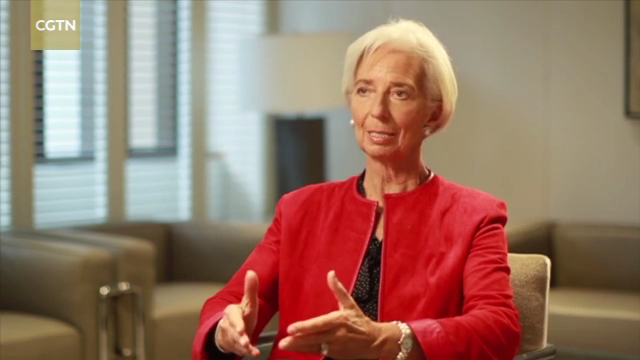
15:22, 13-Oct-2018
International Trade: IMF's Christine Lagarde says tariffs not helpful
Updated
14:23, 16-Oct-2018
04:44

Qingyun Cao: This year's annual meeting comes at a crucial time. You said earlier this year that three dark clouds on the horizon are threatening the global recovery. Have these clouds become more imminent?
I think the sun is still shinning, because we have a pretty solid economic growth compared with the average global growth we had in the last decades and in the last four decades actually. But I also think the clouds on the horizon are becoming darker, and are probably getting closer to us. And I think that it is still very much time to fix the roof when the sun is still shinning. There is a sense of urgency that I hope all policy makers will haveactually address those issues, and prevent the, you know, further materialization of those risks that we have identified.
Qingyun Cao: What are the issues that the IMF will bring to the Meetings in Indonesia?
There are plenty of issues to be debated. I'm certain that trade, and international trade and the benefit of it will be on agenda. I'm certain that the role of new technologies particularly in the financial areas will also be on the agenda. I believe that the burden of debt, particularly in low-income countries and how it weighs on aspiration to development will be on agenda as well. You know, the typical macro economy stability objectives will be debated for sure. I think that will give us plenty to talk about.
Qingyun Cao: We've seen that the biggest economy in the world has started to become more protectionist, and other economies have no choice but to react, which seems to have created a vicious cycle. What is your comment on the recently announced U.S. tariffs on 200 billion dollars worth of Chinese goods?
We've always said at the IMF that trade war, tariffs are not helpful globally and are likely to have negative consequences on global growth. So we've maintained that view. We pretty much hope that reason will prevail and all parties will come to the table, and will agree to improve the rules by which trade happens. You know these rules have to be constantly updated. There is not enough actually free up and facilitation of trade of services. In the old days, most of what was traded was goods. We've seen lots of tariffs on goods. But the key trade of future will be services. As we move into a more digital world, the future of work will also be different. Manufacturing processes will be evolved. We need to constantly update those rules and make sure a leveled playing field, fair competition, and not unfair competition between players. Everybody should look at those issues, but it needs to be done together. That is what we continue to argue as a case for more trade, more openness and more benefits.
Qingyun Cao: What can be done to bring the two sides back to the negotiation table?
You know I was secretary of trade for France for two years. Reaching agreement is a difficult thing, because of the current rules that are currently in place. Nothing is agreed until everything is agreed. Any country can have a voice and any country can stop a process. Those need to be looked at to explore how efficient those rule-based system can operate. I certainly hope that the dialogue can be engaged at the highest level, which is where the impose is given, but also the technical departments that are familiar with those issues. So they can develop and implement the impose given at the top.

SITEMAP
Copyright © 2018 CGTN. Beijing ICP prepared NO.16065310-3
Copyright © 2018 CGTN. Beijing ICP prepared NO.16065310-3